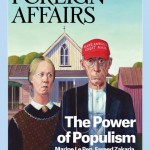Foreign policy experts have long been taught to see the world as a chessboard, analyzing the decisions of great powers and anticipating rival states’ reactions in a continual game of strategic advantage. Nineteenth-century British statesmen openly embraced this metaphor, calling their contest with Russia in Central Asia “the Great Game.” Today, the tv show Game of Thrones offers a particularly
gory and irresistible version of geopolitics as a continual competition among contending kingdoms.
Think of a standard map of the world, showing the borders and capitals of the world’s 190-odd countries. That is the chessboard view. Now think of a map of the world at night, with the lit-up bursts of cities and the dark swaths of wilderness. Those corridors of light mark roads, cars, houses, and offices; they mark the networks of human relationships, where families and workers and travelers come together. That is the web view. It is a map not of separation, marking off boundaries of sovereign power, but of connection.
ANNE-MARIE SLAUGHTER is President and CEO of New America. This essay is adapted
from her forthcoming book, The Chessboard and the Web: Strategies of Connection in a
Networked World (Yale University Press, 2017). Follow her on Twitter @SlaughterAM.
This article appeared in the Foreign Affairs 2016 November/December edition. It is republished here with permission.
This article was originally published by Foreign Affairs. You can read the rest of the article here.
You can read exclusive content from Gateway House: Indian Council on Global Relations, here.
Copyright © 2016 by the Council on Foreign Relations, Inc.


